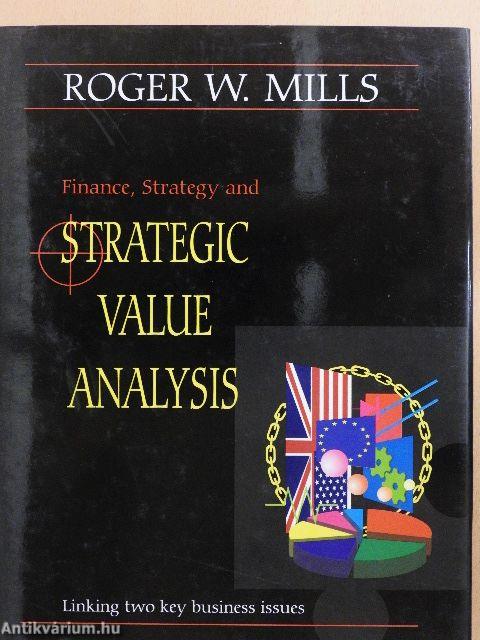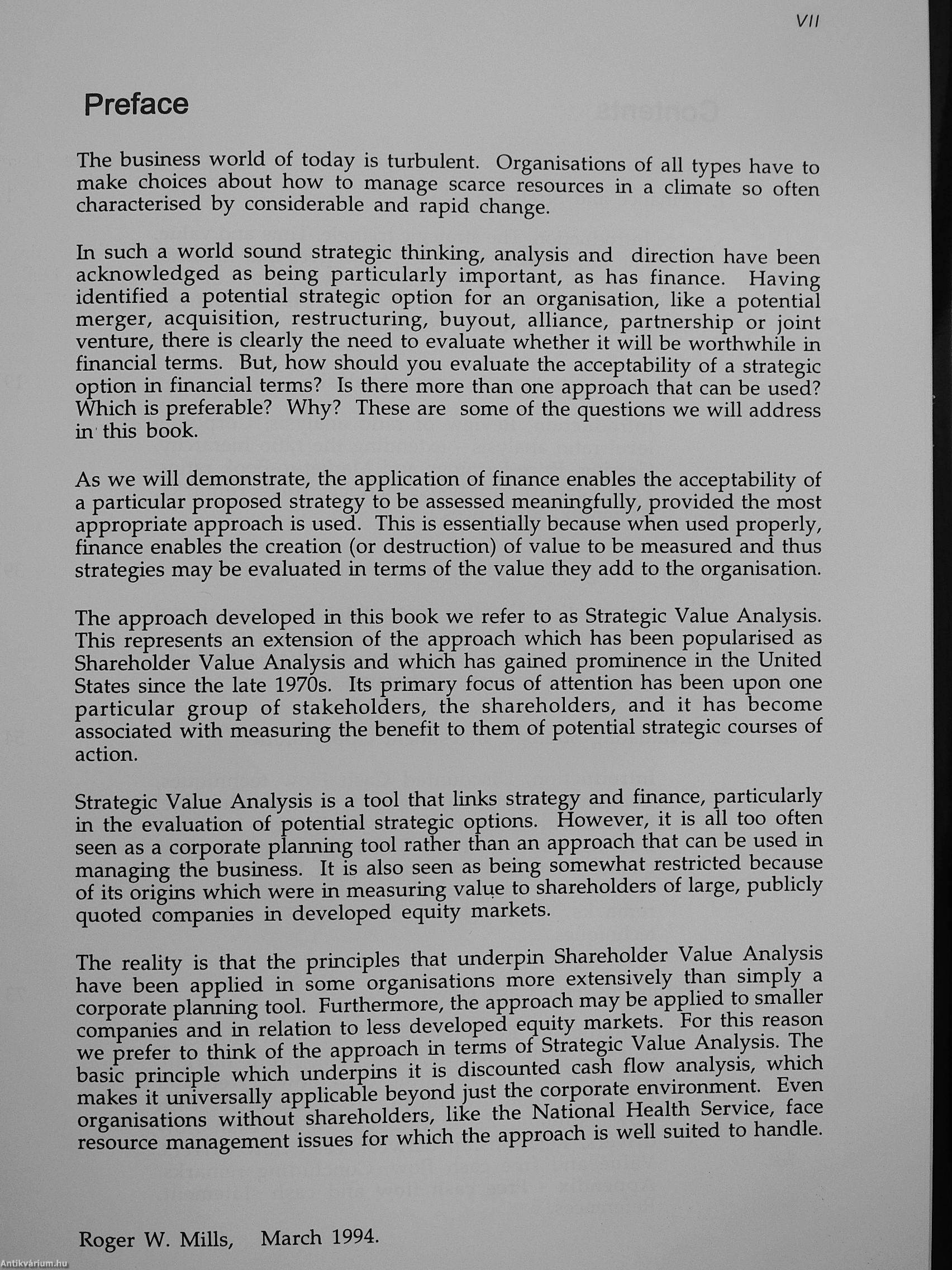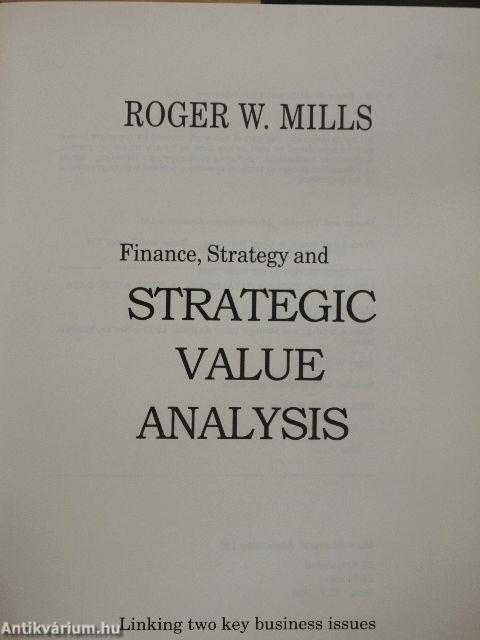1.067.668
kiadvánnyal nyújtjuk Magyarország legnagyobb antikvár könyv-kínálatát

VISSZA
A TETEJÉRE
JAVASLATOKÉszre-
vételek
Finance, Strategy and Strategic Value Analysis
Linking two key business issues
| Kiadó: | Mars Business Associates Ltd |
|---|---|
| Kiadás helye: | Lechlade |
| Kiadás éve: | |
| Kötés típusa: | Varrott keménykötés |
| Oldalszám: | 177 oldal |
| Sorozatcím: | |
| Kötetszám: | |
| Nyelv: | Angol |
| Méret: | 25 cm x 15 cm |
| ISBN: | 1-873186-04-5 |
naponta értesítjük a beérkező friss
kiadványokról
naponta értesítjük a beérkező friss
kiadványokról
Előszó
TovábbFülszöveg
Introduction
The approach developed in this book we refer to as Strategic Value Analysis. This represents an extension of the approach which has been popularised as Shareholder Value Analysis and which has gained prominence in the United States since the late 1970's. Its primary focus of attention has been one particular group of stakeholders, the shareholders, and it has become associated with measuring the benefit to V them of potential strategic courses of action.
Shareholder Value Analysis has developed a reputation as a tool that links strategy and finance, particularly in the evaluation of potential strategic options. However, it is all too often seen as a corporate planning tool rather than an approach that can be used in managing the business. It is also seen as being somewhat restricted because of its origins which were in measuring value to shareholders of large, publicly quoted companies in developed equity markets.
The reality is that the principles that underpin... Tovább
Fülszöveg
Introduction
The approach developed in this book we refer to as Strategic Value Analysis. This represents an extension of the approach which has been popularised as Shareholder Value Analysis and which has gained prominence in the United States since the late 1970's. Its primary focus of attention has been one particular group of stakeholders, the shareholders, and it has become associated with measuring the benefit to V them of potential strategic courses of action.
Shareholder Value Analysis has developed a reputation as a tool that links strategy and finance, particularly in the evaluation of potential strategic options. However, it is all too often seen as a corporate planning tool rather than an approach that can be used in managing the business. It is also seen as being somewhat restricted because of its origins which were in measuring value to shareholders of large, publicly quoted companies in developed equity markets.
The reality is that the principles that underpin the Shareholder Value Analysis have been applied in some organisations more extensively that a corporate planning tool. Furthermore, the approach may be applied to smaller companies, non-commercial organisations and within the context of less developed equity markets. Consequently, we refer to the approach as Strategic Value Analysis.
The basic underlying principle of the approach is discounted cash flow analysis which makes it applicable beyond the corporate environment. Even organisations without shareholders, like the National Health Service, face resource management issues for which the approach is well suited to handle.
Roger Mills is Professor of Accounting and Finance at Henley Management College where he is Director of Studies of the Active MBA Programme and Head of the Accounting and Finance Faculty.
Professor Mills has a first degree in Psychology, Sociology and Economics, a Masters Degree in Management Studies and a PhD in Finance. He trained as an accountant in industry and is a Fellow of the Chartered Institute of Management Accountants (FCMA), a Fellow of the Chartered Institute of Secretaries and Administrators (FCIS), and a Fellow of the Association of Corporate Treasurers (FCT). He is the co-author of Fundamentals of Managerial Accounting and Financc, and is the author of numerous articles in practitioner oriented journals like Management Accounting, the Treasurer, and the Journal of General Management.
Professor Mills has undertaken research, teaching and consultancy assignments relating to strategic financial and value analysis, corporate finance, business valuation, merger and acquisition analysis, and corporate restructuring in the UK, Germany, Hong Kong, Singapore, Malaysia, Brazil, Russia, United States of America, Norway, Switzerland, l-rance, Denmark, Nigeria, South Africa and Spain. Vissza
Témakörök
- Közgazdaságtan > Menedzserképzés, marketing
- Közgazdaságtan > Pénzügy > Egyéb
- Közgazdaságtan > Számvitel, elemzés
- Közgazdaságtan > Közgazdasági elméletek > Tőkés országok gazdasága
- Idegennyelv > Idegennyelvű könyvek > Angol > Közgazdaságtan > Menedzserképzés, marketing
- Idegennyelv > Idegennyelvű könyvek > Angol > Közgazdaságtan > Számvitel, elemzés
- Idegennyelv > Idegennyelvű könyvek > Angol > Közgazdaságtan > Közgazdasági elméletek > Tőkés országok gazdasága
- Közgazdaságtan > Vállalkozások > Általában
- Idegennyelv > Idegennyelvű könyvek > Angol > Közgazdaságtan > Pénzügy > Egyéb
- Idegennyelv > Idegennyelvű könyvek > Angol > Közgazdaságtan > Vállalkozások > Általában












